A NAT KING COLE BIRTHDAY SPECIAL, Part 1: “NAT AND NELSON SWING THE STANDARDS!”
The Greatest Album that Never Was
Very special thanks to Jordan Taylor, the number one Nat King Cole discographer and researcher, for his essential help with this column. Also special thanks to Robert Isaiah for his expert art direction on the album cover you see directly below. Yes! (Also special thanks for expert proofing to Elizabeth Zimmer & Dan Fortune. Yes, yes! It’s all true!)
Nearly all of Nat King Cole’s biggest hits - the songs that are reissued over and over again in compilations and invariably included in tribute shows - are songs that were unique to him. These are songs that he discovered, or were brought to him, and which are invariably associated with him - you can’t sing “Mona Lisa,” “Smile,” or “Unforgettable” without evoking the memory of Nat King Cole.
Yet at the same time, it’s probably not widely appreciated that Cole was a major supporter of what we now call The Great American Songbook, exceptional songs that were already standards when he sang them. In fact, he probably did more than anybody - after Frank Sinatra and Ella Fitzgerald - to establish the notion of a standard repertory of American songs. He recorded many albums of them, sang them on live appearances, and especially on television.
Between 1955 and 1958, Cole and his central collaborator, the great arranger Nelson Riddle, recorded a series of 18 mostly uptempo treatments of what were already well-known standards. During these same years, he recorded two piano-centric albums of standards, The Piano Style of Nat King Cole and After Midnight. But the 18 tracks in question here featured Cole singing, not playing, accompanied by Riddle’s marvelous arrangements.
It’s clear from the sessions themselves as well as from other evidence that we have - including a handwritten sheet from Nat himself - that at least one point in this approximate period, he was planning to release them as an album. The handwritten note indicates that sometime around 1956-57, he was considering ideas for something he described only as a “swing album.”
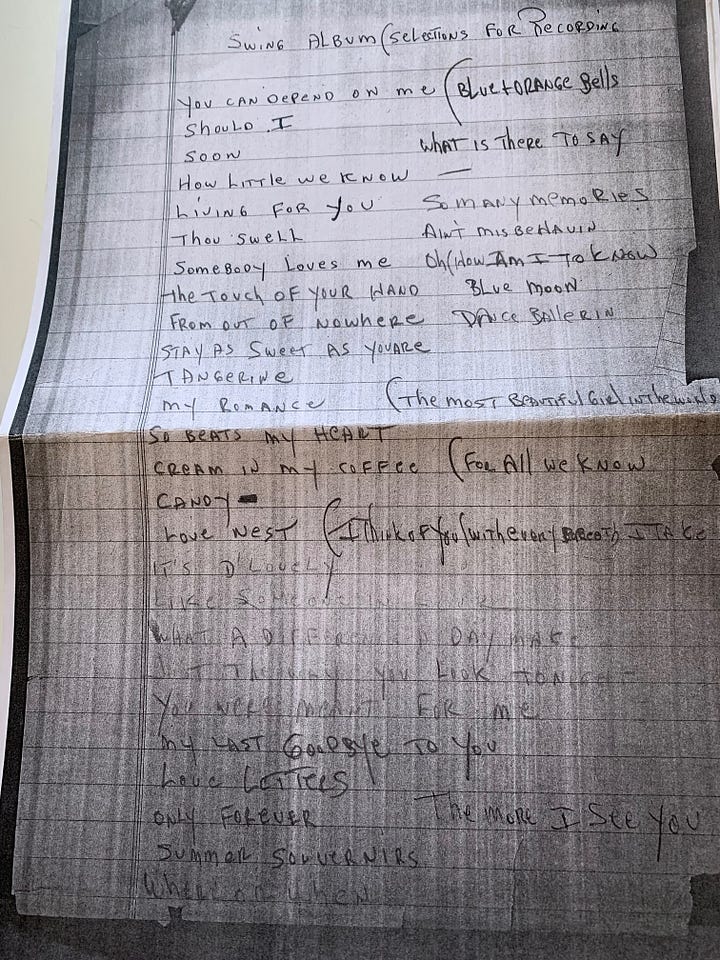
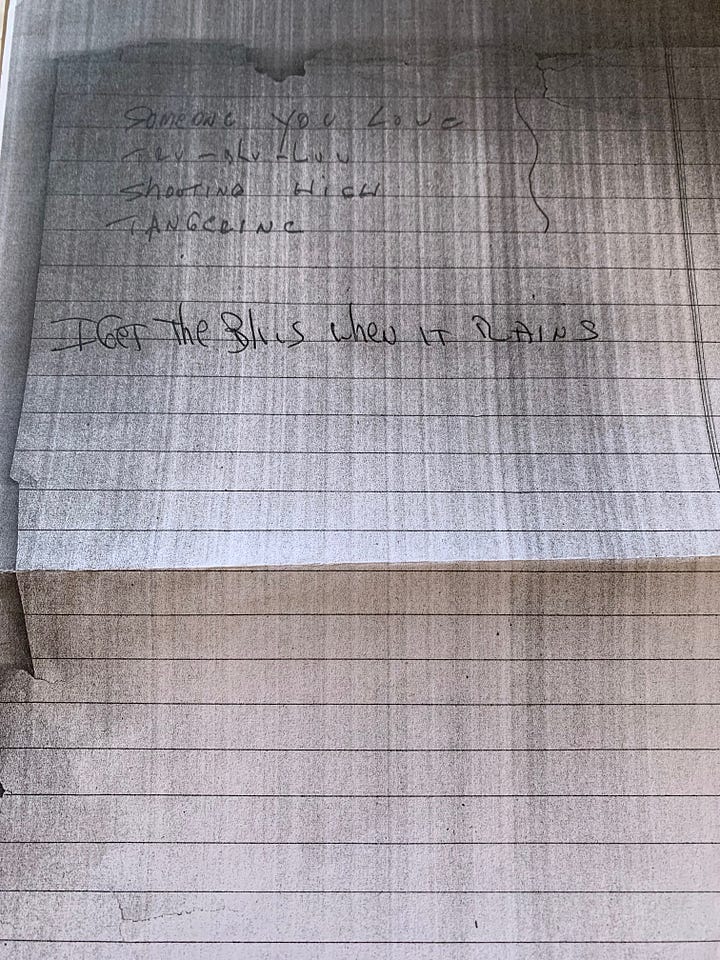
We also know from internal documents at Capitol Records that around 1960, he was planning to gather some of these tracks - probably ballads and love songs - into a set to be titled Sweethearts on Parade.
However, for reasons that are not clear, neither of these album projects actually were released, though Cole and Riddle certainly recorded enough applicable tracks for both of these albums and many more.
So what was the fate of the 18 tracks I am including in this column? Some of these were issued here and there, some were released as singles, at least a few on EPs, some on LPs. Some turned up on compilation albums, others on foreign releases, both during Nat’s lifetime and afterwards. Many, unfortunately, were only heard with atrocious rhythm-section overdubs in posthumous albums like the 1966 Nat King Cole Sings the Great Songs!
In honor of Nat’s 106th birthday, we’re gathering these 18 tracks here, into an imaginary album that never was, complete with a brand new cover created in the vintage Capitol Records house style by our talented young associate, Rob Isaiah. You may be familiar with some of these performances - they were all collected in the massive Bear Family 10-CD box set titled Stardust, but so far this Substack page is the only time they’ve ever been gathered into one place and presented as a comprehensive body of work unto themselves.
Obviously, the album wouldn’t have been 18 tracks - 12 was the norm at that time - but I’m going to provide links to all of them. Regardless of how they were used, or how obscure they currently are, these represent some of the most enjoyable moments in all of the King Cole canon.
Chicago, June 7, 1955
“Breezin' Along With The Breeze” (2:30)
Haven Gillespie, Seymour Simons, & Richard A. Whiting
Like Sinatra, Cole had a penchant for songs he heard as a youngster growing up in the Roaring ‘20s. This was a particularly breezy standard from 1926 written by Richard Whiting - whose singing star daughter Margaret became a close friend to both Cole and Sinatra - in a marvelously well-paced, highly dynamic orchestration by Riddle - two and a half minutes of pure joy. Typically of the songs in this group, it never appeared on an album, but he’s known to have sung this arrangement at least three times on television in 1956 and ‘57.
“Nothing Ever Changes My Love For You” (2:40)
Marvin Fisher & Jack Segal
I am admittedly at least slightly cheating by including this track in this group: in 1956, this was a brand new song, written directly for Cole by his longtime friend Marvin Fisher; it was not a standard, neither then nor, unfortunately, even now. It is, however, a great song, and has been recorded by several modern jazz musicians who were especially hip to the King Cole canon, including Dinah Washington, George Shearing with Billy May’s Orchestra, and the excellent hard bop tenor saxophonist Tina Brooks.
This was included on the 1957 collection LP This Is Nat "King" Cole - which means that more singers should know it and perform it. (Marvin Fisher wrote dozens of superior songs for Nat over a 20-year-period and ultimately served as a pallbearer at his funeral in 1965.) Nelson’s unique writing for trombones and muted trumpets is very much in evidence, as is his innovative use of Latin percussion in a non-Latin context. It’s hard to imagine a more perfect jazz-pop vocal record than this. (PS: In 2022, I did a whole three-hour episode of SING! SING! SING! devoted to the MARVIN FISHER SONGBOOK - featuring Nat King Cole and many others - to listen to that show, click here.)
August 27, 1955, Los Angeles
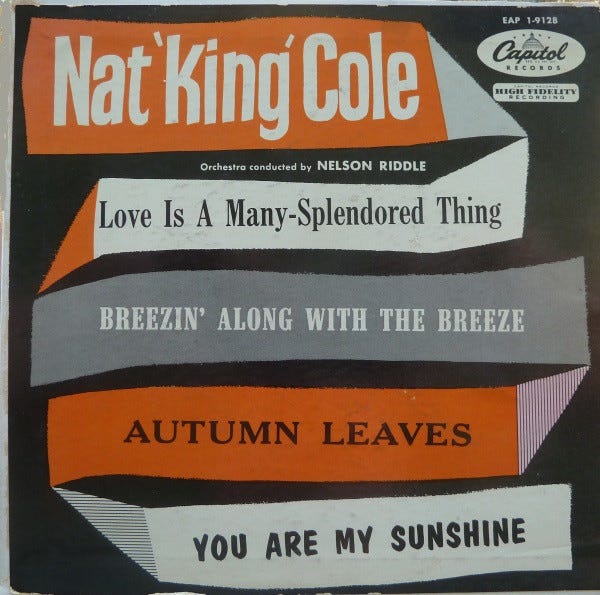
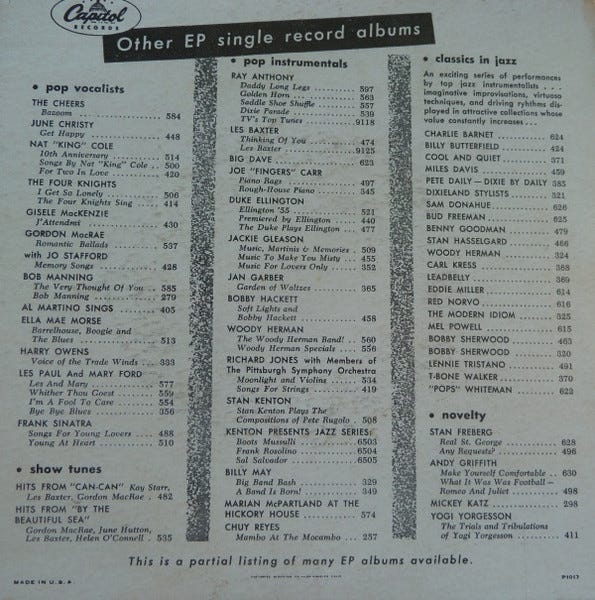
“You Are My Sunshine” (2:28)
Credited to (Governor) Jimmie Davis & Charles Mitchell
An early example of Cole experimenting with what would become one of the major elements of the final part of his career: country & western music. Still, this thoroughly Riddle-esque and highly swinging treatment of a hillbilly standard is very different from later projects like the Rambling Rose album and its sequels. Here we have more distinctive Riddle trombones and muted trumpets, as well as a gloriously swinging saxophone section. On this date, Nat and Nelson recorded “Sunshine” after two instrumentals for the Piano Style album; it was only issued on a 1955 EP and so was pretty rare, but I can’t help but wonder if Ray Charles somehow heard it, since it directly prefigures the entire concept of his 1962 Modern Sounds in Country & Western Music album. Note the “crazy” fade ending. (“get your grimy hand off that dial!”)
(“You Are My Sunshine” is usually credited to the Country music star and governor of Louisiana, Jimmie Davis, but see wiki for a more involved discussion on who actually wrote “You Are My Sunshine.” This track is currently available as part of the digital compilation Nat King Cole from the Vaults, Vol. Four.)
September 9, 1956, Los Angeles
This session offers more concrete proof that Nat and Nelson were working towards an album of swinging standards, in that all three songs recorded on this date fall into this category and were clearly intended to be part of this project.
“How Little We Know” (3:47)
Hoagy Carmichael & Johnny Mercer
Coincidentally Sinatra recorded a very different song with the same title - by his old friends Philip Springer and Carolyn Leigh - in this same year, which perhaps explains why Capitol didn’t release this track until many years after Cole’s death. Apparently, they didn’t want to confuse record buyers with two different songs with the same title released at roughly the same time by the label’s two biggest stars. Then too, this “How Little We Know” is nearly four minutes, way too long for a single, so perhaps this take was just a rough draft, and Cole and producer Lee Gillette would have worked with Riddle to shorten the arrangement and do another take. Still, it’s such a perfect track, with Nat and Nelson gently and non-aggressively swinging, that I hate to imagine it being truncated in any way. There are brief alto interjections by the great Willie Smith, and Cole added a special, original tag in the end - the kind of device that his buddy Billy Eckstine frequently employed, as well as the way Sinatra would sometimes ask songwriters extend a song to give him a little something extra in the end - in which he sings:
Well now, maybe you’re meant to be mine,
And to have you would really be fine.
And I hope in my heart that it’s so,
In spite of how little we know.
Ultimately, when it comes to explaining why this marvelous track has barely been heard at all, as the title says, we know very little.
(Kudos to the contemporary team of Gabrielle Stravelli and Billy Stritch, who currently do a great medley of both songs. This track is currently available as part of the digital compilation Nat King Cole from the Vaults, Vol. Four.)
“Should I?” (2:06)
Nacio Herb Brown & Arthur Freed
Sinatra really deserves credit for reviving this 1930 song from an early talking picture, Lord Byron of Broadway, on his great (but seldom heard) 1950 album Sing and Dance with Frank Sinatra - in fact, Sinatra may have inspired his friend Arthur Freed, the songwriter and producer who wrote it, the idea of reviving “Should I?” in his 1952 songbook-driven classic movie musical Singing’ in the Rain. I have no doubt that Nat and Nelson were very familiar with all three previous incarnations of the song: the 1930 film and the original dance band recordings, the Sinatra album, and the movie musical masterpiece. Cole revived this two-minute gem on his TV show - he swings even harder than Sinatra, who himself sang a Riddle arrangement on his 1961 Swingin’ Session album. (This track is now available as part of the digital compilation Nat King Cole from the Vaults, Vol. Three.)
“Ballerina” (2:52)
Carl Sigman & Bob Russell
Perhaps befitting a song about a dancer, this Nat-Nelson arrangement truly has legs. Carl Sigman and Bob Russell were both best known as lyricists, so I suspect that for this, as well as their other major standard together, the Billie Holiday classic “Crazy He Calls Me” (also recorded by Nat), they both worked on words as well as music together. In 1947, this song was a big hit for crooner Buddy Clark, who sang it in a much more melodramatic rendition - a tale that was perfect for the postwar era in that it seemed to encourage all those young women who were in the workforce during the WW2 years to go back to the home and forget about their careers - and it was also performed by the King Cole Trio on their 1946-48 NBC radio series King Cole Trio Time. As you can hear below, they were already swinging it even in 1948.
Below: “Ballerina” (1948) from King Cole Trio Time, NBC Radio, February 28, 1948. (courtesy Jordan Taylor)
1956:
Sands 1960
1961:
(live 1956)
Using that 1948 Trio arrangement as their starting point, the Nat-Nelson interpretation is wildly and irreverently swinging; the central character herself is herewith less of a ballerina and more of a Lindy hopper. You’ll note that the studio version was barely heard at the time, but Cole and Lee Gillette did a stunning new version which they used to open their classic 1960 album Live at the Sands. Cole considered this Riddle arrangement to be enough of a classic that he also recorded it in stereo in 1961 for the Nat King Cole Story project. (All three Capitol versions, as well as a 1956 NBC TV performance, are included above.)
TO BE CONTINUED
PS: this week on my radio show, Sing! Sing! Sing!, I’m devoting the whole program to the concept of NAT & NELSON SWING THE STANDARDS. To listen, click here.
Coming this Wednesday March 12 - tonight! - THE NEW YORK ADVENTURE CLUB presents the first of a three-part virtual online series on THE ELLA FITZGERALD SONGBOOKS - ELLA FITZGERALD SINGS THE GEORGE & IRA GERSHWIN SONGBOOK. (For info and reservations, click here. All presentations are available for replay viewing for one week after the live event.)
Sing! Sing! Sing! : My tagline is, “Celebrating the great jazz - and jazz-adjacent - singers, as well as the composers, lyricists, arrangers, soloists, and sidemen, who help to make them great.”
A production of KSDS heard Saturdays at 10:00 AM Pacific; 1:00PM Eastern.
To listen to KSDS via the internet (current and recent shows are available for streaming.) click here.
The whole series is also listenable on Podbean.com; click here.
SING! SING! SING!
The NAT KING COLE birthday Special - Nat & Nelson swing the Standards
(SSS #139 2025-03-15)
download: <or> play online:
The DON COSTA Centennial Special!
(SSS #138 2025-03-08)
download: <or> play online:
Ella Fitzgerald: "Ella's Race Problem" with Judith Tick
(BLACK HISTORY MONTH 2025-02-24)
download: <or> play online:
Nat King Cole: "We Are Americans Too" (“Assault on a King”)
(BLACK HISTORY MONTH 2025-02-18)
Download: <or> play online:
THE REAL AMBASSADORS with special guest Ricky Riccardi
(Black History Month 2025-02-17)
download: <or> play online:
SLOUCHING TOWARDS BIRDLAND is a subStack newsletter by Will Friedwald. The best way to support my work is with a paid subscription, for which I am asking either $5 a month or $50 per year. Thank you for considering. (Thanks as always to Beth Naji & Arlen Schumer for special graphics.) Word up, peace out, go forth and sin no more! (And always remember: “A man is born, but he’s no good no how, without a song.”)
Note to friends: a lot of you respond to my SubStack posts here directly to me via eMail. It’s actually a lot more beneficial to me if you go to the SubStack web page and put your responses down as a “comment.” This helps me “drive traffic” and all that other social media stuff. If you look a tiny bit down from this text, you will see three buttons, one of which is “comment.” Just hit that one, hey. Thanks!
Slouching Towards Birdland (Will Friedwald's SubStack) is a reader-supported publication. To receive new posts and support my work, consider becoming a free or paid subscriber.
Slouching Towards Birdland (Will Friedwald's SubStack) is a reader-supported publication. To receive new posts and support my work, consider becoming a free or paid subscriber.





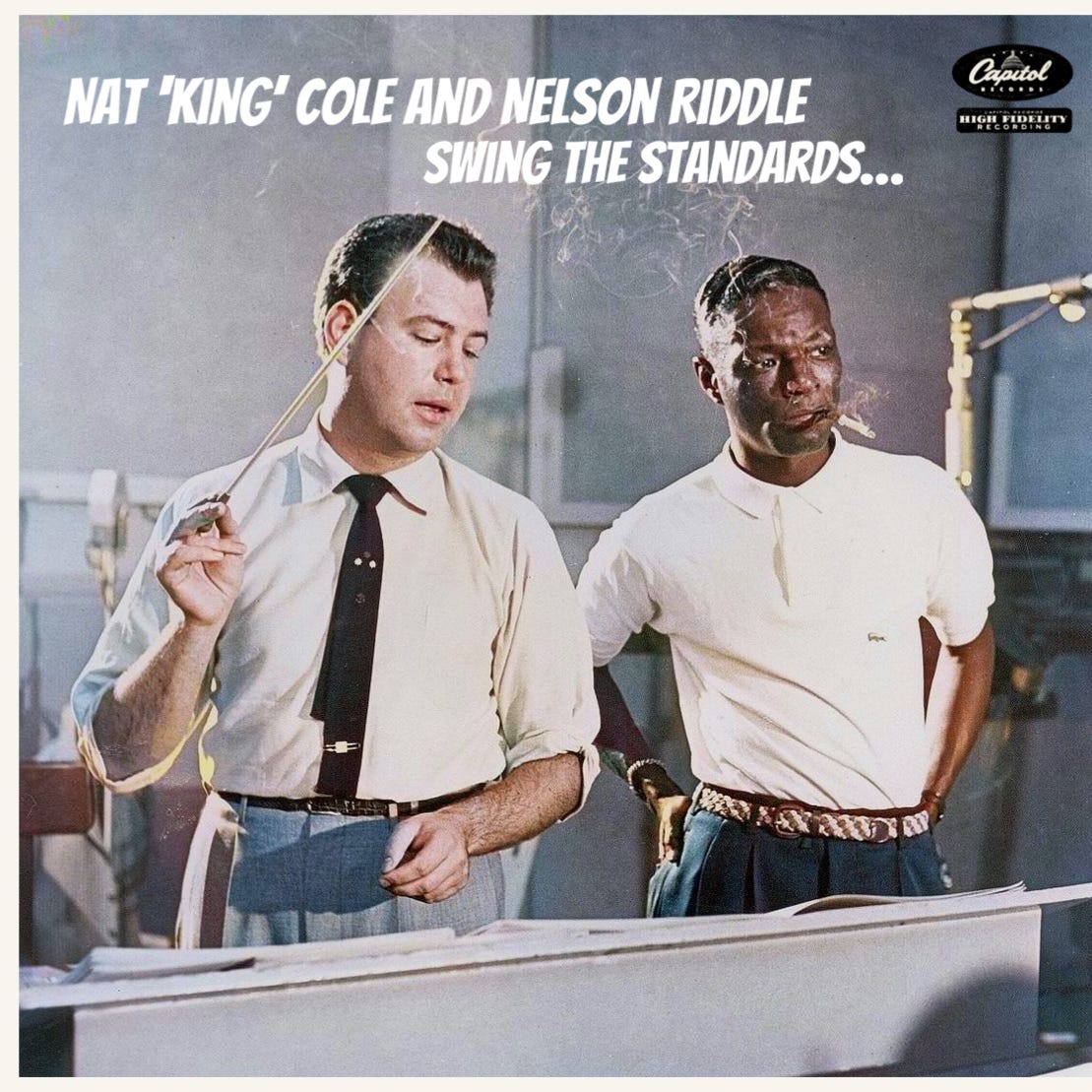

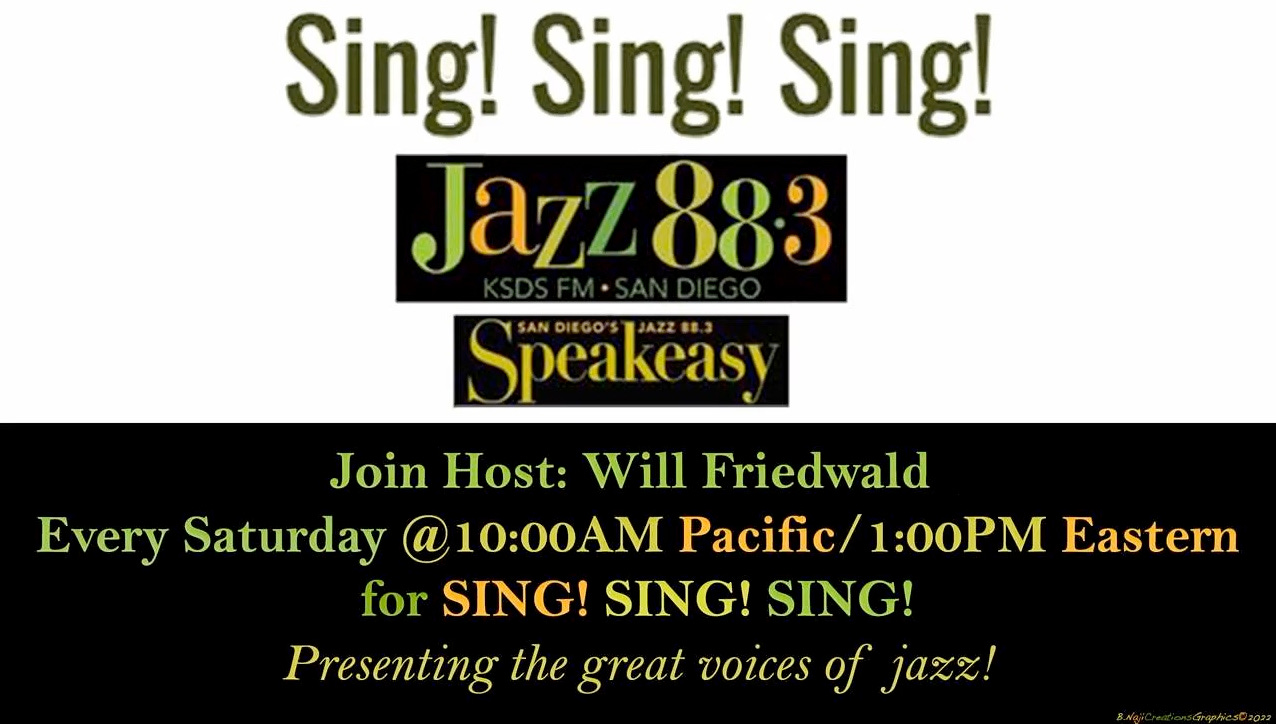
How Little We Know is a marvelous song. I've never heard a bad version of it. Buddy Clark recorded it for V-Disc. Stephanie Nakasian did a wonderful version of it with the Jim Cullum Jazz Band. Even the soundtrack version (from "To Have And Have Not") with Hoagy Carmichael and Lauren Bacall is great. And contrary to some sources Lauren does sing on the number--not a young Andy Williams.
a simply marvelous post!